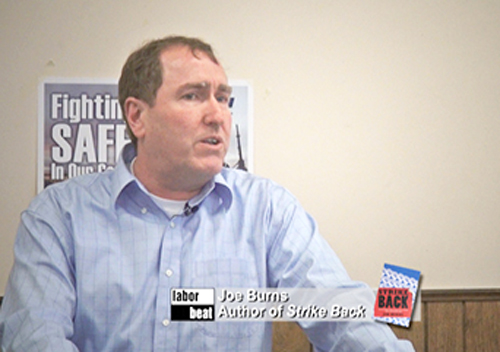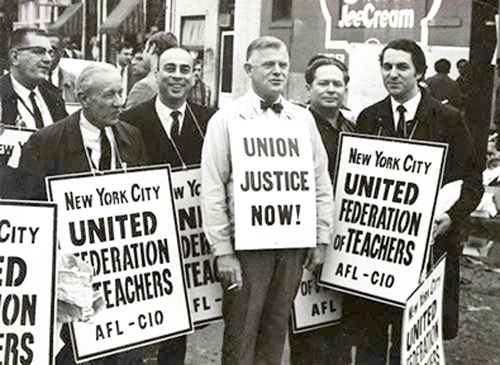Reviving the strike... Reviving unions? '...Anyone who's sat at the bargaining table really knows that they don't care about your arguments or your words, and at the end of the day it's about power...'
Could Reviving the Strike Revive the Labor Movement? That's the question asked on a new Labor Beat video now available on YouTube at: http://youtu.be/fnOYPV7AABc. The video is also archived at: laborbeat.org
Joe Burns, author of "Strike Back," was the guest speaker of the Chicago Labor Speakers Club on March 21, 2015. His topic was "Could Reviving the Strike Revive the Labor Movement?"
 Joe Burns author of Strike Back. Photo by Labor Beat.Burns provides useful historical perspective for workers looking to reverse the downward trend in union membership in the last several decades. He reminds us of what the essence of trade unionism is -- the strike. "Anyone who's sat at the bargaining table really knows that they don't care about your arguments or your words, and at the end of the day it's about power. And our power is based upon our ability to stop production of the employer and cause economic harm to the employer."
Joe Burns author of Strike Back. Photo by Labor Beat.Burns provides useful historical perspective for workers looking to reverse the downward trend in union membership in the last several decades. He reminds us of what the essence of trade unionism is -- the strike. "Anyone who's sat at the bargaining table really knows that they don't care about your arguments or your words, and at the end of the day it's about power. And our power is based upon our ability to stop production of the employer and cause economic harm to the employer."
Beginning with the strike upsurges in the 1930s and the rapid evolution of labor legislation in the 1930s-40s -- from the Wagner Act, Taft-Hartley legislation, creation of the NLRB -- Burns talks about how legislation which originally was used by unions as a form of protection was transformed through employer-controlled governments to thwart unions. "What basically you have over the years is an increasingly tightening noose around the labor movement."
Burns then goes to the heart of the matter: "So when we ask ourselves why do we have a weak and ineffectual trade union movement today...we have to look at the fact that the rules of the game are rigged."
The history of public sector unions since the 1960s shows a way forward. They simply defied laws prohibiting them from striking and, through mass membership and public support mobilizations, created the critical mass to control the political climate, leading to changed legislation.
Burns makes an important distinction between public sector and private sector strikes. When public employees strike, management doesn't experience financial stress. They still collect money (taxes). Therefore, public employee unions find additional ways (such as what is now called social unionism) to overwhelm management and anti-labor governments. But when private industry strikes happen, the name of the game is to put the employer under financial duress (stop production). For private sector strikes, public support in and of itself will not win the strike. "An example would be the Jefferson, WI strike against Tyson in 2004...They had great community support...or the Detroit newspaper strike...but we weren't able to translate that support into economically harming the employer."
 'Illegal' strikes by teachers in New York and Chicago during the 1960s led to collective bargaining for teachers and other public workers. Above, New York's United Federation of Teachers on the picket line in 1960. By 1980, Illinois had passed a collective bargaining law for public workers, but in New York state the collective bargaining virtually prohibits strikes by teachers by fining the union's members double the daily pay for each day of a strike, and New York's Democratic Party "friends" have kept that law in place for decades.Summing up his historical overview, Burns suggests how the labor movement can regain power. And that is by a return to the basics of unionism: strikes and strike upsurges -- including general strikes, though such are not predictable, nor can they be easily brought about by decree.
'Illegal' strikes by teachers in New York and Chicago during the 1960s led to collective bargaining for teachers and other public workers. Above, New York's United Federation of Teachers on the picket line in 1960. By 1980, Illinois had passed a collective bargaining law for public workers, but in New York state the collective bargaining virtually prohibits strikes by teachers by fining the union's members double the daily pay for each day of a strike, and New York's Democratic Party "friends" have kept that law in place for decades.Summing up his historical overview, Burns suggests how the labor movement can regain power. And that is by a return to the basics of unionism: strikes and strike upsurges -- including general strikes, though such are not predictable, nor can they be easily brought about by decree.
The political aspects -- whether such a new strike upsurge today can lead to similar or greater political/legislative transformations as in the 30s -- was not specifically addressed.
Speech is edited for time fit. Enhanced with archival footage and photos. Length - 22:58
Produced by Labor Beat. Labor Beat is a CAN TV Community Partner. Labor Beat is a non-profit 501(c)(3) member of IBEW 1220. Views are those of the producer Labor Beat. For info: mail@laborbeat.org , www.laborbeat.org . 312-226-3330. For other Labor Beat videos, visit YouTube and search "Labor Beat".
Labor Beat's facebook page:
http://www.facebook.com/pages/LABOR-BEAT/167503422257

